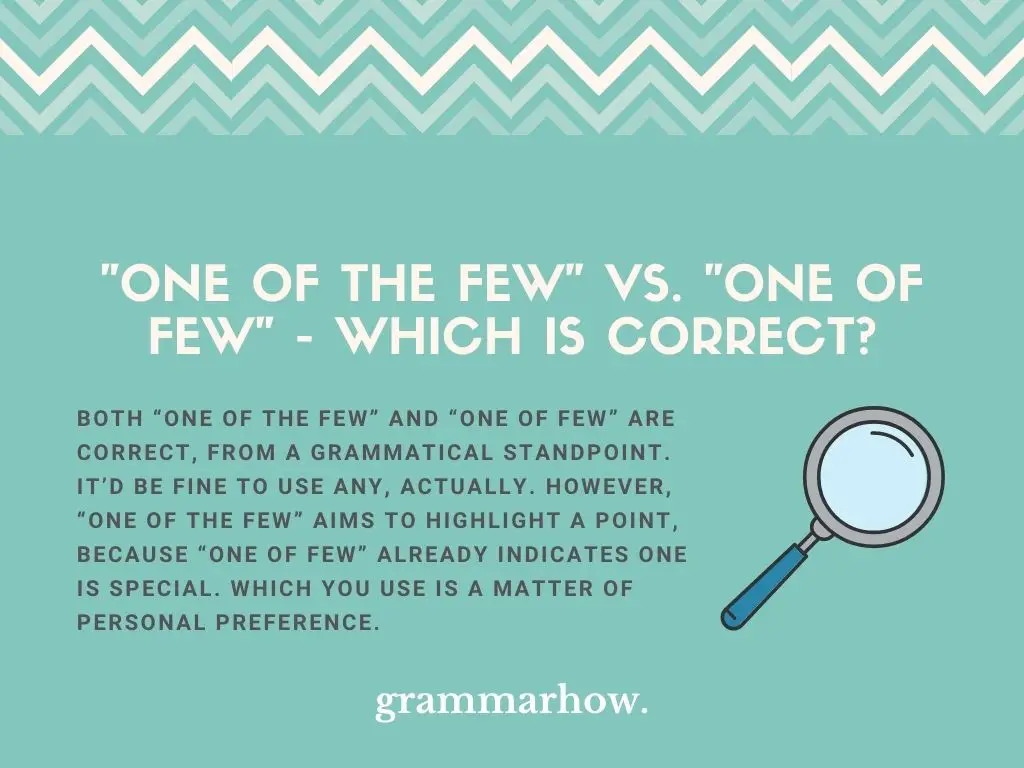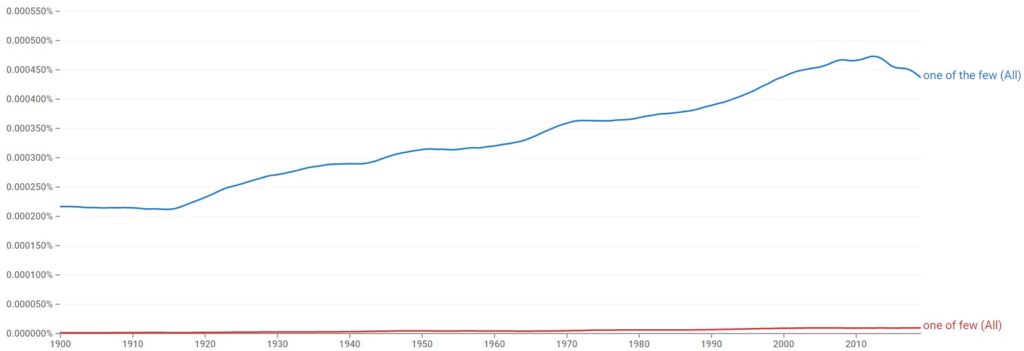How do you separate one item from the others, with the goal of shining a light on one of them? How to bring emphasis to something? Would you say, for example, “One of the Few” or “One of Few”?
Are both forms correct? Should one be avoided? Let’s find out!
“One of the Few” vs. “One of Few” – Which is Correct?
Both “One of the Few” and “One of Few” are correct, from a grammatical standpoint. It’d be fine to use any, actually. However, “One of the Few” aims to highlight a point, because “One of Few” already indicates one is special. Which you use is a matter of personal preference.

Let’s take a look at the examples below:
- I was one of the few students chosen for the scholarship program.
- I was one of few students chosen for the scholarship program.
To say “One of the Few” seems to try to reinforce the fact that the person was selected from an already small group. It’s definitely a selling point, in a way.
Still, you can see by the second sentence, that “One of Few” does the trick and sends the same message, only perhaps in a more subtle way. Keep in mind, though, that you could interchange both expressions and still not harm your content.
One of the Few
“One of the Few” is an expression that intends to separate an item from the others. The goal with it is to emphasize one individual, for the better or for the worse, detaching it from a crowd.
Take a look at some examples of “One of the Few” form at work:
- She was one of the few selected to the program.
- Being one of the few in the company who had a working knowledge of the subject, she was chosen as team leader.
- Being one of the few selected for the project carried a lot of pressure.
- That was only one of the few mistakes they’d made on the project.
- One of the few teachers I liked at school just quit.
- One of few teachers I liked at school just quit. (incorrect)
In most cases, “One of the Few” and “One of Few” can interchange. However, there are exceptions. Sentences 5 and 6 show that.
In those sentences, only “One of the Few” works, because we’re talking about a group within a group. All the teachers in school are the major group. “The teachers I liked” is a group within this big group.
From this already selected group, one individual is put on the spotlight: the teacher who just quit. Because this example shows one special person, selected from an already special group, you must use “One of the Few”.
One of Few
“One of Few” carries the same meaning as “One of the Few” and should be used to put emphasis on one item and separate it from the others. Perhaps it has a slight lower tone, because it lacks “the” in its form. But it’s still correct and can be used just the same.
Let’s look at some examples:
- I was one of few in the country qualified for this job.
- She was one of few in the entire world with this genetic mutation.
- It was a big deal to be one of few chosen for the competition.
- It was difficult being one of few Spanish speakers in an English speaking school.
- The country was one of few in the world with substantial protections to the environment.
Which form do you like best and think you’d use more often, “One of Few” or “One of the Few”?
Which Is Used the Most?
Which one of the two forms is used more frequently? Do you think people say “One of the Few” or “One of Few” more often?
We have a graph from Google Ngram Viewer to look at and find out.

“One of the Few” is used with expressively more frequency than “One of Few”. Considering the goal of this expression is to give emphasis and put a particular item on the spotlight, we think it makes perfect sense.
However, it doesn’t mean one form is more acceptable than the other. Both are correct and you should feel free to choose the one that makes more sense in the sentence you’re constructing.
“One of the Few” or “One of a Few”?
“One of the Few” and “One of a Few” have the same meaning and should be used the same way – you just need to choose which one you prefer. It means that one item among the crowd deserves a special place and should be emphasized.
These are some examples:
- He was one of the few people chosen for the position.
- He was one of a few people chosen for the position.
